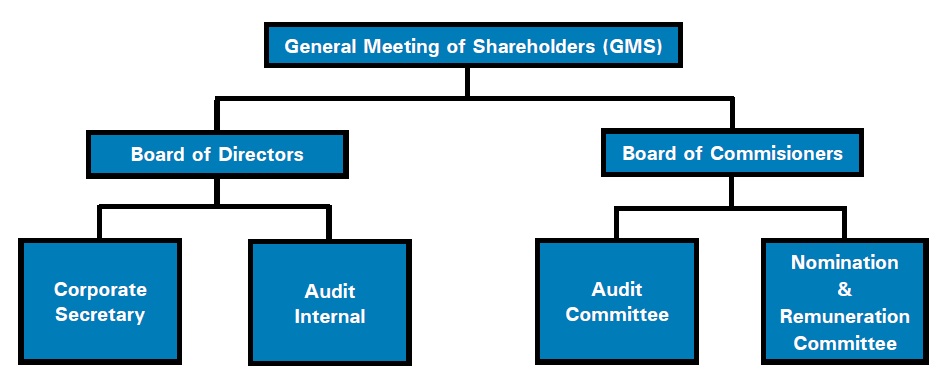The implementation of Corporate Governance is one of the primary keys in achieving the Company’s Vision to become a “World Class Company” for its business partners, investors, shareholders, employees, and the general public. With the implementation of Corporate Governance of the highest standards, the Company has been able to increase its competitiveness and win the trust of various stakeholders, including shareholders, employees, local communities and governments, the central government, and even foreign partners.
In implementing Corporate Governance, the Company always ensures the proper management of competent human resources, sound risk management, prudent financial management, and compliance to prevailing laws and regulations. The Company also seeks to prevent possible conflicts of interest.
Active roles and full support from the Board of Commissioners and Directors are important in ensuring the implementation of good corporate governance principles, which include transparency, accountability, responsibility, independence as well as equality and fairness in every aspect of business and within the Company.
Apart from complying with the guidelines set by the Indonesian Code of Good Corporate Governance (ICGCG), which is published by the National Committee on Governance in 2006, the underlying objective is to provide systems that help ensure the smooth running of the Company and its subsidiaries and help the investors and other stakeholders to gain assurance regarding management decisions through implementing the five principles of GCG:
- Transparency
Transparency and adequate disclosure regarding material information of the company’s operation need to be sustained, because financial and non-financial information submitted by the company is the basis of the investors’ decision making. The Company implements this principle in, among things:
- Submitting Annual Report
- Periodic Financial Reports: annual and quarterly financial reports.
- Developing and communicating business plans to the public
- Other reports required of the Company as a listed company
- Accountability
The precision of every function of every unit in the company is very crucial as this is related to the implementation of duties and authorities, and in turn, the accountability of one’s performance. The Company implements this principle through establishing clear assignment of duties (e.g. determining the scope of work, specifying the details of duties and authorities of each unit in the Company) and its performance measure.
- Responsibility
The Company understands responsibility as a conformance in the management of the Company with the rule and regulation and sound corporate management principles. The Company is responsible for complying with the existing law, including the regulations related to employment, tax, business competition, and health and occupational safety. The Company implements this principle by, but is not limited to:
- Complying with the Company’s Article of Association and existing laws on the way the Company conducts its activities
- Fulfilling tax obligation in a good and timely manner
- Carrying out its Corporate Social Responsibility (CSR) program
- Meeting its obligation of disclosure in accordance with the capital market regulation
- Independence
The Company has to maintain the independency of each unit in its organization and each employee in every unit in order to uphold professionality in the company management and working relationship so that any conflict of interests might be avoided. The Company implements this principle through submitting disclosure regarding the transactions containing conflict of interests, in accordance with the Capital Market regulations. Apart from this, the Company appointed an independent party as the Independent Commissioner to sustain the independency of the Board of Commissioners.
- Fairness
The stakeholders in the company should receive fair treatment in accordance with the prevailing regulations. The Company implements this principle as follows:
- Shareholders have all the rights to attend and vote in the Shareholders Meeting in accordance with existing laws.
- The Company treats all business partners equally and transparently
- The Company provides a good and safe working condition for all employees in line with the Company’s ability and existing laws.
